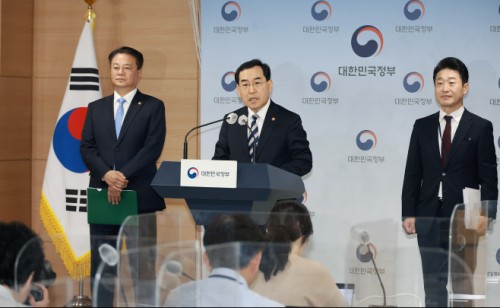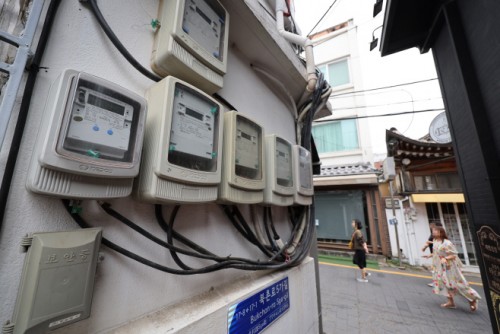 |
| Minister of Trade, Industry and Energy Lee Chang-yang speaks during a press briefing at the Seoul Government Complex in Seoul, on May 15, 2023./ Source: The Ministry of Trade, Industry and Energy |
AsiaToday reporter Choi Won-young
South Korea will raise the electricity and gas charges, which will cause a four-member household to pay about 3,000 won and 4,400 won more per month, respectively. This is to make up for the accumulated mounting losses of state-run Korea Electric Power Corp. (KEPCO) and the Korea Gas Corp. (KOGAS). The minister in charge has come up to explain why the government has no choice but to raise fares and announced measures for the vulnerable.
Industry Minister Lee Chang-yang announced a public explanation on how to adjust electricity and gas rates. Electricity rate will rise by 8 won (US$0.01) per kilowatt hour (kWh) and gas rate by 1.04 won per megajoule (MJ). As a result, a four-person household will bear an additional 7,400 won (US$5.52) increase on average in their combined monthly electricity and gas bills from June, the government said.
The new rate system will take effect Tuesday and will not be applied retroactively.
“I feel heavy-hearted to cause burdens and concerns to the public with the increase in electricity and gas rates following the first quarter,” Minister Lee said. “Even though we have continuously adjusted rates from last year to early this year, the accumulated rate hikes have not yet been completely resolved.”
According to the government, KEPCO recorded its combined operating losses of 38.5 trillion won (US$28.8 billion) in 2021 and 2022, before posting an operating loss of 6.2 trillion won (US$4.6 billion) in the first quarter of this year. KOGAS had some 11.6 trillion won (US$1.3 billion) in uncollected payments at the end of March, soaring from 8.6 trillion won (US$6.4 billion) last year.
The government explained that if financial conditions of the energy pubic firms continue to worsen, stable power purchases and gas introduction could be disrupted. It is said that the ecosystem of the energy industry could become vulnerable due to reduced facility investment and construction orders of public enterprises.
“We cannot rule out a situation on where their financial crisis could spread to the financial market and further to the overall economy,” Lee said.
 |
| Electric meters set up at a residential building in Seoul./ Source: Yonhap News |
The government plans to provide strong support to the vulnerable. The implementation of the hike will be postponed for one year for socially vulnerable groups of people earning less than 50 percent of the country’s median income. In addition, it will expand its energy voucher scheme, increasing the total amount by 7.5 percent, as well as the range of recipients.
#electricity #gas rate #bill #fare
Copyright by Asiatoday
Most Read
-
1
-
2
-
3
-
4
-
5
-
6
-
7





















